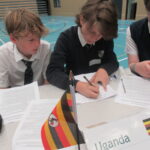On Thursday, September 28th, eight dedicated school council members from Frederick Bremer School embarked on an enlightening journey to the Forest School. Their mission: to participate in a thought-provoking climate conference that aimed to address the pressing global issue of climate change. Representatives from three different schools gathered to engage in meaningful discussions, and each team f four students was assigned the task of representing a specific country. This conference, which unfolded as an inspiring day of speeches, debates, and collaborative solutions, left a lasting impact on all attendees.
The day began with passionate speeches from the young representatives, highlighting how their assigned countries had contributed to the collective effort to achieve net-zero emissions since the historic Paris Agreement in 2015. The two countries chosen to be represented by Frederick Bremer School were the European Union (EU) and Uganda. These choices offered a striking contrast, allowing students to shed light on the very different circumstances faced by these regions.
The students from Frederick Bremer School demonstrated remarkable poise and knowledge as they presented their countries’ perspectives. They discussed the EU’s concerted efforts in reducing emissions and transitioning towards renewable energy sources. Conversely, they highlighted Uganda’s unique challenges, emphasising the importance of international support and solidarity for developing nations grappling with climate change.
Following the compelling speeches, a lively debate ensued. The EU team faced a pivotal question: would they pledge more financial support to combat the climate crisis, specifically to assist poorer nations? Their response was thoughtful and strategic. They expressed a willingness to contribute more funds, but with a condition: other major players, like India, should also commit to substantial emissions reductions. This nuanced stance reflected the complex negotiations that often take place on the global stage in climate discussions.
In the afternoon session, students from different countries formed collaborative teams to develop joint proposals aimed at tackling specific aspects of climate change, such as deforestation, ocean conservation, and financing initiatives. This collaborative approach encouraged diverse perspectives and innovative solutions, underscoring the importance of international cooperation in addressing the climate crisis effectively.
The conference was not only educational but also an enjoyable experience for the Frederick Bremer School students. They had the opportunity to engage in meaningful discussions, learn from their peers, and actively contribute to the discourse on climate change. The event served as a reminder of the critical role young voices play in shaping the future of our planet.
In conclusion, the climate conference held at Forest School on September 28th was a resounding success. It provided a platform for students from different schools to come together, discuss climate-related issues, and work towards collaborative solutions. Frederick Bremer School’s representatives eloquently portrayed the unique challenges and contributions of their assigned countries, making their mark on the conference. This event underscored the importance of youth engagement and international cooperation in addressing the urgent climate crisis that affects us all.





